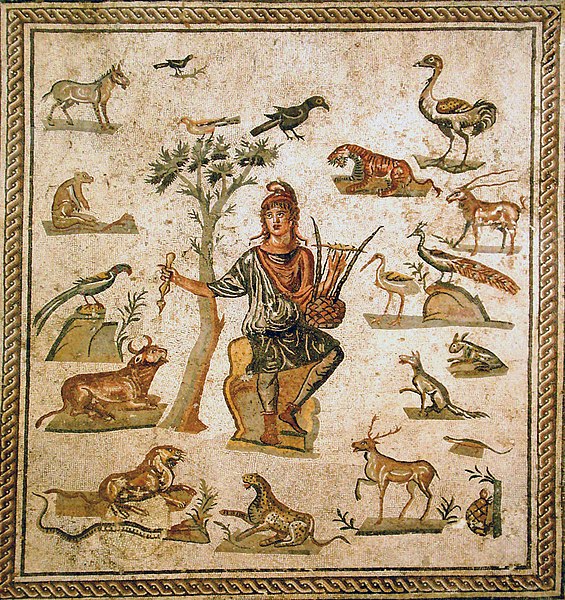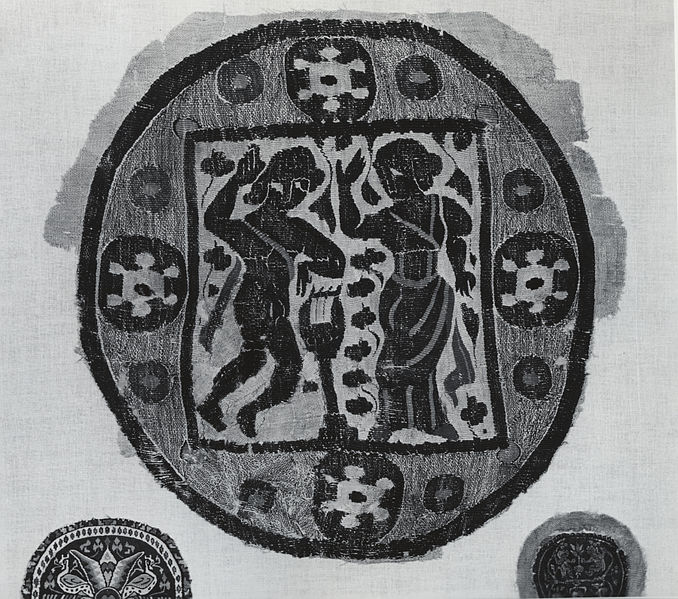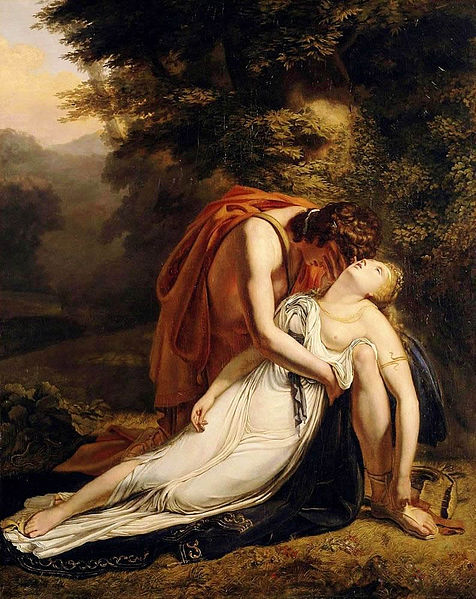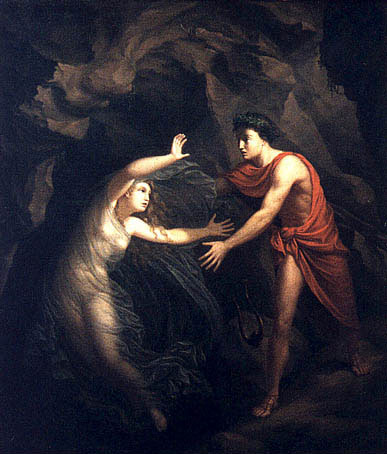Before we begin, I wanted to say in advance that this post is going to be different than my older posts were. I am going to be looking at material from the ancient world, the medieval world, and even the modern world in review of this story. I hope you enjoy it anyway. Now onto the material,
Orpheus is one of the most recognized characters in Greek Mythology. No, seriously, his story has been remade so many times throughout human history that Orpheus and his wife Eurydice probably deserve to be formally immortalized as staples of western culture, if they are not already.
From popular musicals like Hadestown to operas like L’Orfeo to many different poems and novels, the story has been retold and retold over and over again. There are even many works that simply just parody the general story of Orpheus and Eurydice.
With Valentine’s Day being a week ago and Spring beginning in approximately a month, I felt it was finally appropriate to make a post about this tragic love story from mythology that has not only survived the test of time but rather taken the arts by storm and driven whole new directions within them.
And it is, in fact, a tragic love story. Because Orpheus, through one small act of turning around, makes a mistake he will regret for the rest of his life.
Who Is Orpheus?

Orpheus, according to the accounts given by the Ancient Greeks, was a Thracian Bard. Him being a Thracian Bard is particularly interesting, as Greeks did not typically like the Thracians and had classified them as war seeking savages in other tales.
Orpheus was possibly the son of the King of Thrace or potentially the son of Apollo, it varies by version. What stays consistent though is that Apollo taught him how to make music. By getting this teaching from Apollo, the literal god of music, Orpheus becomes so good at playing that all the people, all the nymphs, and all the gods love to hear him play.
At one point, Orpheus adventured with Jason and his Argonaut crew. His ability to play such incredible melodies that everyone loved allowed him to save the day on several occasions.
At one point, Chiron explained to Jason that Orpheus’s music would be able to allow them safe passage through the islands of the Sirens. Those Sirens that the Argonauts encounter are the very same Sirens that would later be counted by Odysseus in the events of the Odyssey.
When Orpheus heard the Sirens begin to sing their beautiful songs that enticed many sailors to come to them, he resisted the temptation of the Sirens. Quickly retrieving his lyre, Orpheus played his own music that was louder and much more pleasant to the ear than even the music of the Sirens allowing the crew to make it through safely.
What Is The Story Of Orpheus And Eurydice?

Finally, we get to the most famous story about Orpheus which is the story of himself and his wife. Orpheus met a beautiful woman named Eurydice and the two fell deeply in love with each other. On their wedding day, Orpheus played songs he had made about the joy he felt for his new wife and the love he felt for her while Eurydice danced to the music and everyone in attendance had a wonderful time.
However, after only being married for a little while, Eurydice dies. How exactly that happens depends on your version. Sometimes she dies by an illness or natural cause of some kind, sometimes she dies because she a poisonous snake attacked her while she was wandering around in the woods, sometimes she dies because she gets bitten by a poisonous snake while trying to escape a Satyr that’s trying to force himself upon her, and sometimes she even dies by just being clumsy while hanging out with some nymphs and in the process falls into a random nearby pit full of poisonous snakes and dies.
A frequency of snakes in the Eurydice death story seems to indicate that a snake likely had something to do with it. However, exactly how or why Eurydice ended up with a poisonous snake, or group of poisonous snakes, that then kill her is usually up to who you’re listening to tell the story.
There are versions where Eurydice actually dies at their wedding, there are versions where Eurydice dies the day after the wedding, there are versions that just describe it as her dying “soon after” they were married. Most versions do not imply that the two lovers had been married for more than a little while at most.
Regardless of how she died or how soon she died, Eurydice’s death becomes the driving factor for the rest of Orpheus’s story. Orpheus becomes incredibly grieved over her death. Using his lyre, Orpheus began to play songs out of his grief which moved literally the entire world.
Orpheus’s mourning was so powerful that every living being on the earth heard the music and learned of his anguish. Even the gods hear it and mourn with him.

After a period of mourning, Orpheus begins his descent down to Hades to try and save his wife. In some versions, the gods, or sometimes specifically Hermes, tell Orpheus to do it but in other versions he just comes up with the decision himself.
Either way, when Orpheus attempts to pass into the land of Hades the gods give him their favor so that he can survive the journey as any other human would surely die attempting such a feat. Orpheus then has to brave the challenges of the underworld.
He has many encounters with souls of the dead at the River Styx until he comes face to face with Cerberus. Cerberus is the three-headed dog that guards the gate of the underworld. Normally, encountering Cerberus as a living being could be a perilous interaction, but Orpheus manages to sway the dog over to not kill him by playing his music for him.
Making it past the gate, Orpheus navigates his way through the rest of the underworld and finds Hades and his wife Persephone. Orpheus makes his case to them, but, while Persephone takes pity on him, they don’t budge on the issue.
Faced with denial, Orpheus begins playing his music again and produces a song so heartbreaking that it moves the underworld and even Hades. The god of the departed feels compassion for the young man and so they make a deal.
Hades will allow Orpheus to take Eurydice back with him, but only under the conditions that she has to follow behind him while he walks back out of the underworld and that he is not allowed to turn around and look at her. Orpheus agrees to the conditions, far more than desperate at this point to get his wife back.
Orpheus thanks Hades and then begins his ascent back out of the Underworld. However, Orpheus cannot hear Eurydice following behind him and is not allowed to turn around and look at her.
Just a few feet away from the exit, Orpheus turns around, breaking his deal with Hades, and sees that Eurydice was in fact following him. She is then thrust back into the depths of the underworld, now trapped in the land of Hades forever.
So Why Did He Do It?

Doubt is a powerful, powerful thing. It sows the seeds of suspicion, fear, paranoia, distrust, and many other negative feelings. By this point in his story, the point by which Orpheus turns back, we have to consider what has happened to him.
The man was a hero who had survived his adventures, found someone he loved that loved him back, and settled down. Then, before he could even get used to such a life all of it is thrown away from him.
In an attempt to restore what he has lost, he takes a journey that literally brings him through Hell and back. Orpheus has to appease and win the favor of literal gods and monsters just to survive.
It hurts so much to watch, because we know the calm, collected hero that Orpheus was at the beginning of his stories would have no problem completing the task within Hades’s deal. The tragedy truly hits home because throughout every version of it we see the deconstruction of Orpheus’s character one way or another through his grief and perilous journey and it all comes to a head at the lack of capability for him to trust Hades will honor the deal.
This story is perhaps one of the most iconic romantic tragedies of all time, and for good reason. For one it works great as a musical or opera, but two the story does its absolute best to make you feel sympathetic for Orpheus through showing you the extents of his grief and what he’s willing to go through for his love.